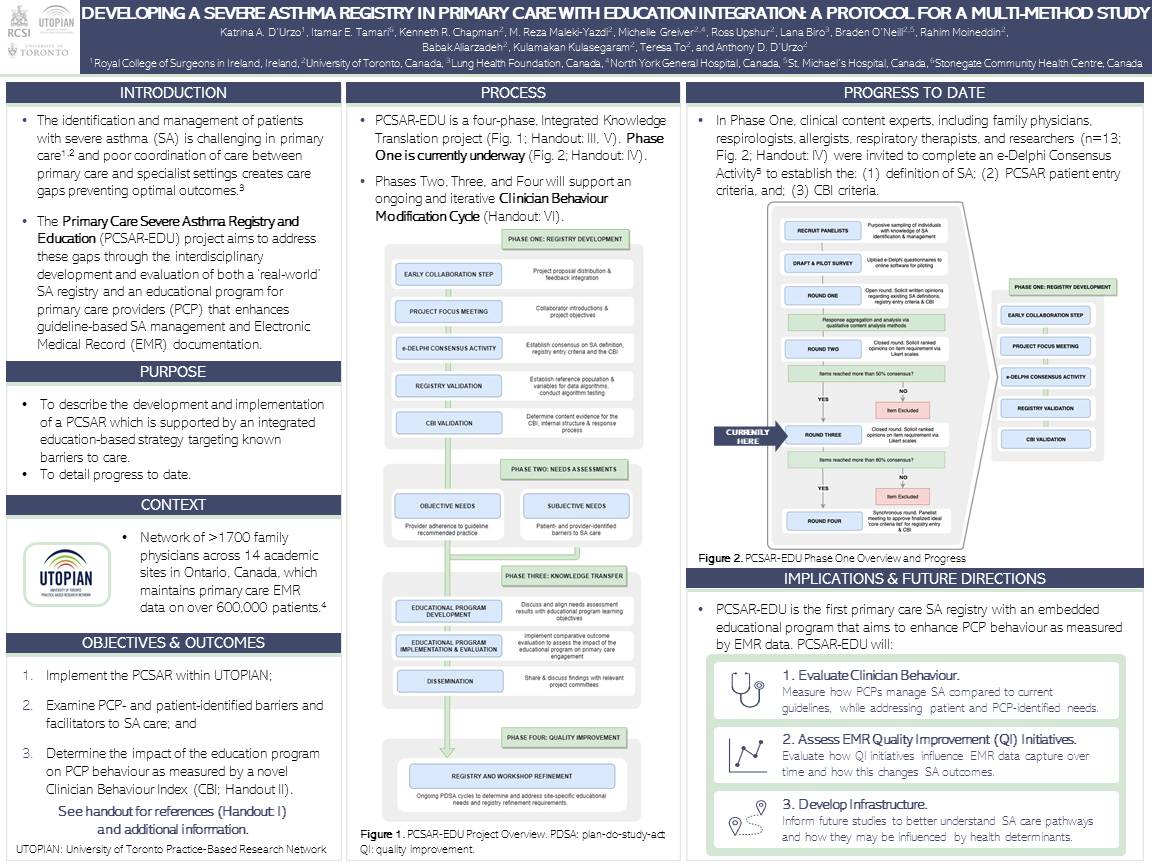PRP025: Developing a severe asthma registry in primary care with education integration: A protocol for a multi-method study
Gurnoor Brar, BSc, MPH; Katrina D'Urzo, MSc; Rahim Moineddin, PhD; Babak Aliarzadeh, MD, MPH; Kenneth Chapman, MD, FRCPC, MSc, FACP, FCCP, FERS; Michelle Greiver, MD, MSc, CCFP; Teresa To, PhD, MSc; Kulamakan Kulasegaram, PhD; M. Reza Maleki-Yazdi, MD, FRCPC; Anthony D'Urzo, MD, MSc, BPHE, CCFP, FCFP; Lana Biro, RRT, CRE, Lung Health Foundation; Itamar E Tamari, MD, CCFP, FCFP; Braden O'Neill, MD, PhD
Context: While most asthma is mild to moderate, severe asthma accounts for disproportionate personal and societal costs. Poor care co-ordination between primary care and specialist settings is recognized widely as a barrier to achieving optimal outcomes. The Primary Care Severe Asthma Registry and Education (PCSAR-EDU) project aims to address these gaps through the interdisciplinary development and evaluation of a ‘real-world’ severe asthma registry and an educational program for primary care providers (PCP) that enhances guideline-based asthma management and electronic medical record (EMR) documentation. Objectives: (1) Establish the PCSAR to aid in the early identification, management, and referral of patients with severe asthma; (2) Develop, implement and evaluate an educational program designed to support PCP in the collaborative management of patients with severe asthma. Study Design: Four phase multi-method study. Setting: 14 primary care academic sites affiliated with the University of Toronto Practice-Based Research Network (UTOPIAN). Population: PCP and patients affiliated with UTOPIAN. Intervention: Phase 1: e-Delphi methods will be used to establish consensus among primary care, respiratory care specialists and allied health professionals on specific criteria for the: (i) definition of severe asthma; (ii) generation of a severe asthma registry; and (iii) definition of a Clinician Behaviour Index (CBI), with EMR data serving as an objective indicator of PCP guideline adherence. Phase 2: Subjective needs will be assessed with questionnaires that examine patient and PCP–identified barriers and facilitators to asthma management. Objective needs will be assessed through chart reviews that determine the CBI of participating PCP. Phase 3: Develop, implement and evaluate an asthma education program designed to improve severe asthma identification and EMR data capture. Phase 4: Utilize evaluation results to inform project quality improvements. Main Outcomes: (i) Implement the PCSAR within UTOPIAN; (ii) Examine PCP and patient-identified barriers and facilitators to severe asthma care; and (iii) Determine the impact of the education program on the CBI. Conclusions: PCSAR-EDU will facilitate collaboration among primary and secondary care providers and allied health care providers, improve awareness about severe asthma management and strengthen data capture in the EMR reflecting severe asthma management in primary care.

Jack Westfall
jwestfall@aafp.org 11/21/2021This is a great topic and research study. Nice work. Thanks